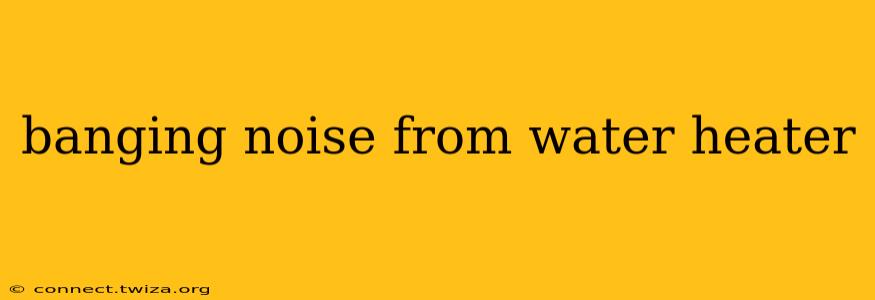A banging noise emanating from your water heater is a common problem, but it's one that shouldn't be ignored. This unsettling sound, often described as banging, popping, or rumbling, can indicate a variety of issues, some minor and easily fixable, others potentially serious requiring professional attention. This comprehensive guide will help you diagnose the problem and find a solution.
Why is My Water Heater Making a Banging Noise?
The most common cause of banging noises in a water heater is thermal expansion. As water heats, it expands. This expansion can cause pressure to build within the tank, leading to the characteristic banging sound as the water forcefully expands and contracts against the tank walls. This is particularly noticeable in older heaters or those with sediment buildup.
What Causes the Banging in My Water Heater?
Here's a breakdown of potential causes, addressing common questions people ask:
1. What causes the banging sound in my hot water heater? Is it dangerous?
The banging sound itself isn't inherently dangerous, but it indicates a problem that could become dangerous if left unchecked. The most likely culprits are thermal expansion, sediment buildup, or a failing expansion tank (if your system has one). While the noise is annoying, the underlying issue – excessive pressure – could eventually lead to leaks or even tank rupture.
2. Is a banging water heater a sign of a failing heating element?
While a failing heating element can contribute to strange noises, it's less likely to be the direct cause of a consistent banging sound. The banging is usually related to pressure fluctuations, not the heating element itself. However, a failing element might contribute to overheating, exacerbating the thermal expansion problem.
3. How do I fix a banging water heater?
The solution depends on the root cause. Here are some steps you can take:
-
Reduce Water Temperature: Lowering the thermostat setting on your water heater can reduce the amount of expansion and thus minimize the banging. Try lowering the temperature by 10-20 degrees and see if it makes a difference.
-
Flush the Tank: Sediment buildup at the bottom of the tank restricts water flow and exacerbates thermal expansion. Flushing the tank removes this sediment, improving efficiency and reducing banging. Consult your water heater manual for instructions on how to properly flush your specific model. Note: This is best done with the power to the heater switched off and the water supply shut off.
-
Check the Expansion Tank (if applicable): If your system has an expansion tank, it's designed to absorb the pressure fluctuations from water expansion. A failing expansion tank will not alleviate the pressure, contributing to the banging. A professional plumber should inspect and potentially replace this tank.
-
Address Hard Water: Hard water contributes significantly to sediment buildup. A water softener can help prevent future issues and prolong the life of your water heater.
4. My water heater is making a popping noise. What does that mean?
A popping noise is often a less intense version of the banging sound and typically points to the same underlying causes: thermal expansion and sediment buildup.
5. Why is my water heater making a rumbling noise?
A rumbling noise might indicate more significant problems such as a failing dip tube or sediment buildup that's restricting water flow even further. In such cases, professional assistance is advised.
6. When should I call a plumber for my banging water heater?
If the banging is severe, persistent despite trying the above solutions, or accompanied by other unusual sounds or leaks, it’s crucial to call a qualified plumber. Ignoring the problem could lead to more expensive repairs or even a dangerous situation.
Preventing Future Banging
Regular maintenance is key to preventing banging noises. This includes annual flushing of the tank, monitoring water temperature settings, and addressing hard water issues. By taking proactive steps, you can extend the lifespan of your water heater and avoid costly repairs.
Remember, this information is for guidance only. Consult a qualified plumber for diagnosis and repair if you're unsure about any aspect of your water heater. Safety should always be your top priority.
